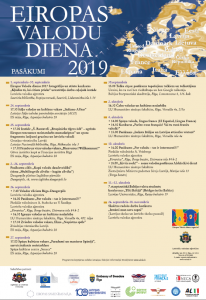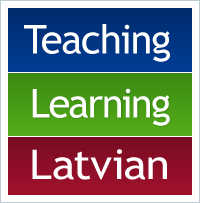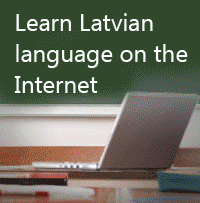The European day of Languages 2019
The Latvian Language Agency held the European Day of Languages events – an annual celebration of language that has taken place every  year on September 26 since 2001. The European Day of Languages is celebrated in all the member states of the European Union and it focuses on European languages, linguistic diversity and language learning. Involving several partners, these events have been organized and coordinated by the Latvian Language Agency for the fifteenth year.
year on September 26 since 2001. The European Day of Languages is celebrated in all the member states of the European Union and it focuses on European languages, linguistic diversity and language learning. Involving several partners, these events have been organized and coordinated by the Latvian Language Agency for the fifteenth year.
The first event of the European Day of Languages event program was held on September 1 in the Sauriešu library in Stopiņi district, where the photo exhibition “Kļūdies tā, lai citiem prieks” (“Make mistakes so that everyone can enjoy them”) was open until September 30.
From September 2 to September 26, the Daugavpils City Board of Education organized a series of events titled “Kopā valodu daudzveidībā” (“Together in the diversity of languages”). The main topic of the events was “A multilingual person – a rich person”.
Early on the morning of September 26, everyone traveling to Daugavpils on the 7.40am train had the opportunity to enrich their journey and learn something new about language, literature and the people working in the culture sector on the Language Train from Riga to Daugavpils. The Latvian Language Agency accompanied the passengers aboard the train and the event was hosted by Roberto Meloni with musicians Julgī Stalte and Ēriks Zeps who performed during the trip.
A discussion was held at 4pm at “Birojnīca” (84 k-2 Dzirnavu street, Berga Bazārs) between linguists Anna Stafecka and Vilma Šaudiņa who discussed various dialects and the richness of language. This event was one of a series of events titled “On language – it can be interesting?!”.
At 4.30pm a lesson on Estonian language and culture was organized by the lecturers and students of the University of Latvia’s Faculty of Humanitarian Sciences (at 42a Visvalža street, room 402) which gave the attendees an opportunity to learn something new about our Estonian neighbours.
At 5.30pm, in collaboration with the Swedish embassy and the European Union House in Riga we held a Swedish language event during which we also screened the Swedish romantic drama “A Serious Game”. Anders Olsson – a Swedish language professor at the University of Latvia and the Academy of Culture of Latvia – gave a masterclass that evening alongside another professor of Swedish at the University of Latvia – Ivars Orehovs. The film “A Serious Game” (“Den allvarsamma liken”, 2016, director Pernilla August) is an adaptation from Hjalmar Söderberg’s 1912 novel. The film was screened in Swedish and featured subtitles in Latvian. The plot follows journalist Arvid Stjärnblom and the daughter of a local artist Lydia Stille who both share a dream of one day finding true, pure love. Making the dream a reality, however, requires greater sacrifices than they could have ever imagined. The film is about certain choices that we may or may not encounter in our lives, as well as their consequences.
On September 27, the Spanish cultural centre “Séneca” in collaboration with the European Union House in Riga organized an interesting and practical Spanish culture evening titled “The customs and manners of Spain”. The director of the Spanish cultural centre “Séneca” – Javier Fernández Cruz – also held a masterclass that evening about Spanish greetings. The event provided an opportunity to learn a variety of interesting facts about the Spanish language and Spanish customs and challenged a few stereotypes about Spain. The event was held from 5pm at the European Union House in Riga, at 28 Aspazijas Blvd.
An event offering future written and oral translators an opportunity to challenge themselves was held at 3pm on September 30 at the Baltic International Academy at 4 Lomonosova street, auditorium 116. The event was titled Translation wars: an event for future written and oral translators, and the organizers of the event sought to capture everyone’s attention with the following challenge: “Find out what you’re capable of when not using a smartphone and Google translate!”
The lecturer Nadežda Kopoloveca held a lesson on Czech language and culture on October 2, 4.30pm at the Faculty of Humanitarian Sciences at 4a Visvalža street, room 215a. The lesson explored the traditions of Czech national holidays, as well as words and phrases associated with the celebration and commemoration of such events. The lesson was held in Czech, but the attendees were not required to have any previous knowledge of the language.
The Faculty of Humanitarian Sciences (4a Visvalža street) held an event on October 4 gathering people interested in several roman languages: Spanish, French and Italian. The professors and students from the Centre for Iberian and Latin American Studies organized the event “El Español, Lingua Franca” from 2pm offering a variety of topics and activities:
- a journey into the history of the Spanish language (an interactive presentation on the origin of the Spanish language, its interaction with other languages in Europe and Latin America, concluded with a word game at the end of the presentation);
viaje a la Historia del Español (una presentación interactiva sobre el origen del español, su historia y contactos con otras lenguas en Europa y America Latina seguida por el juego de palabras);
- the known and the unknown in Spanish culture (a quiz);
lo conocido y lo desconocido de la cultura española (concurso);
- ERASMUS studies in Spain (the experience of ERASMUS students);
estudios ERASMUS en España (experiencias compartidas por los estudiantes ERASMUS);
- singing in Spanish (a small concert);
cantemos en español! (Concierto.)
A competition was held from 2.30pm for those who do not speak or think they do not speak French titled “Parlez-vous français?/Do you speak French?”
The event “An insight into the history of Italian-Latvian relations” was held from 3pm and the attendees were offered little known facts about the relations of both countries as well as the opportunity to converse in Italian during the language activities.
Continuing the series of events “On language – it can be interesting?!”, the Latvian Language Agency organized a discussion with Andrejs Veisbergs at “Birojnīca” (84 k-2 Dzirnavu street, Berga Bazārs) on October 10. The linguist and translator spoke about the translating profession and language culture.
October 10 is Aleksis Kivi’s birthday so the event “Kivi is rock!” was held for those interested in the Finnish language at the Nordic Council of Ministers’ Office in Latvia at 13 Marijas street (Berga bazārs). The event started at 6pm and was organized by the lecturers and students from the Faculty of Humanitarian Sciences.
The 7th international Baltic student conference “Bridges in the Baltics” was held from October 11 to October 12 at the University of Latvia at 19 Raiņa Blvd.
The Latvian Language Agency organized an event asking pupils and students in Latvia and those attending Latvian schools elsewhere in the world to submit their creative essays and drawings in the competition “Describe a dream”. The competition took place from September 26 to November 18.
The European Day of Languages is an initiative by the Council of Europe and organized in Latvia by the Latvian Language Agency in collaboration with its partners: the European Commission, the House of the European Union in Riga, the University of Latvia, the National Library of Latvian, the Georgian Embassy in Latvia, the Swedish Embassy in Latvia, the Goethe Institute in Riga, the French Institute in Latvia, the Spanish Culture Center “Séneca”, the Italian Language Teachers Association, the Daugavpils City Education Board, the Baltic International Academy, and AS “Pasažieru vilciens”.
All events were free of charge, except for the tickets necessary to board the Language train from Riga to Daugavpils.
We invite everyone in Latvia and abroad to join us in enriching the experience of learning and using the languages spoken in Europe, while simultaneously appreciating and using our national language – Latvian – in their everyday affairs.



